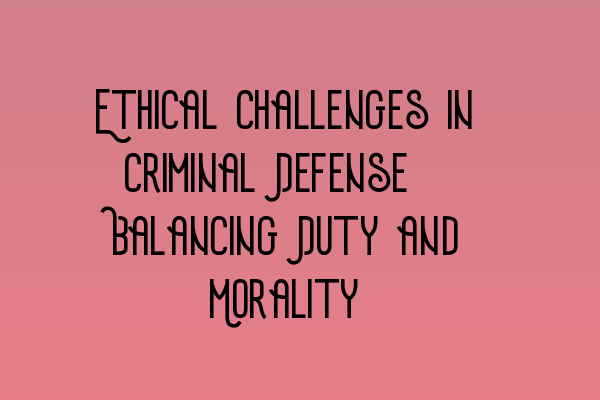Ethical Challenges in Criminal Defense: Balancing Duty and Morality
As criminal defense solicitors, we often find ourselves in challenging situations, where our duty to our clients clashes with our personal sense of morality. It is in these moments that we are faced with the ethical dilemma of balancing our obligations to the justice system with our own principles.
One of the primary ethical challenges in criminal defense is representing clients who are potentially guilty of serious crimes. Our duty is to provide a robust defense and ensure that our clients receive a fair trial. However, this can be at odds with our personal belief in upholding justice and preventing harm to society.
While it is important to remember that everyone deserves legal representation, regardless of guilt or innocence, it is essential for criminal defense solicitors to navigate these situations with utmost care and ethical consideration. Here are some key points to consider:
The presumption of innocence
Central to the legal system is the principle of the presumption of innocence. It is our duty as criminal defense solicitors to uphold this principle and ensure that our clients are treated fairly. By providing a strong defense, we play a crucial role in maintaining the integrity of the criminal justice system.
This principle also means that we must separate our personal opinions from the cases we handle. While we may have moral reservations about certain actions, it is essential to approach each case objectively and ensure that our clients’ rights are protected.
Confidentiality and trust
Another ethical challenge is maintaining confidentiality and trust. Our clients trust us with sensitive information and rely on our discretion. It is crucial to honor this trust and uphold the principles of attorney-client privilege.
However, there may be situations where our moral compass is tested. For instance, if a client admits to a crime during consultations, we must balance our duty to keep their information confidential with our ethical obligation to prevent harm to others.
It is important to seek guidance from professional bodies and ethical frameworks to navigate such situations correctly. Consulting with experienced colleagues and undertaking ongoing professional development can help us find the right path forward.
Ensuring justice and fairness
As criminal defense solicitors, our primary goal is to ensure justice and fairness in the legal process. This means advocating for our clients’ rights while fulfilling our wider duty to the community and society as a whole.
In some cases, seeking justice might involve negotiating plea bargains or presenting mitigating circumstances to the court. While these actions may seem at odds with our personal views, they are essential in achieving the best possible outcome for our clients, while still adhering to ethical standards.
The importance of self-reflection
To navigate the ethical challenges of criminal defense, it is crucial to engage in regular self-reflection and introspection. By reassessing our values, beliefs, and motivations, we can ensure that our actions align with our personal and professional ethics.
Constantly evaluating our role as criminal defense solicitors allows us to strike a balance between our duty to clients, the legal system, and our own moral compass. It also enables us to grow as professionals and contribute to the ongoing improvement of the criminal justice system.
In conclusion, the ethical challenges in criminal defense require careful consideration and a delicate balance between duty and morality. As solicitors, we must uphold the principles of justice and fairness while representing clients who may have committed serious crimes. By navigating these challenges with integrity and professionalism, we can fulfill our obligations to the legal system while staying true to our personal values.
For further resources and information on the SQE exams and legal preparation courses, kindly visit the following articles:
